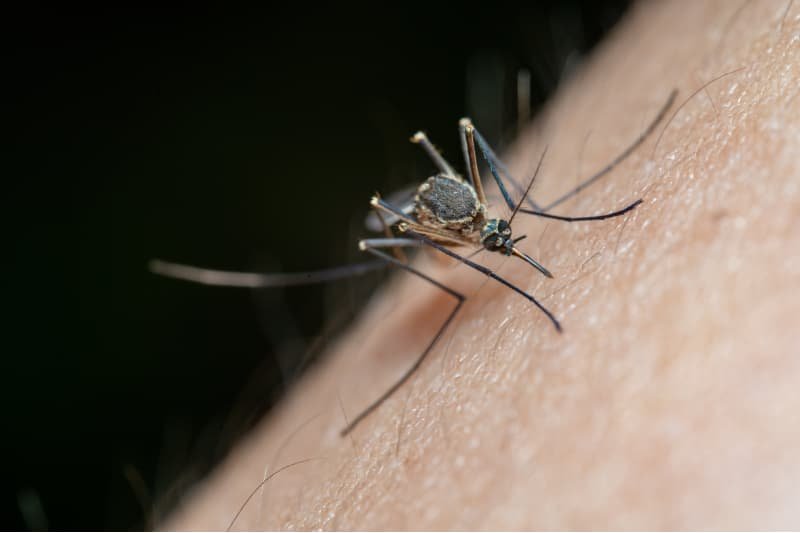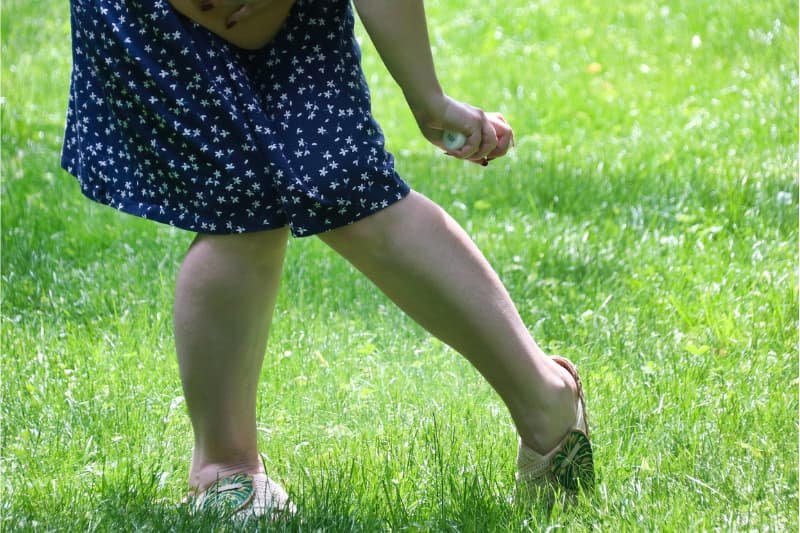
Summer is here, and with it comes the pesky presence of mosquitoes. These tiny pests have an insatiable appetite for our blood, leaving us covered in itchy red bumps. But have you ever wondered how many times can a mosquito bite you? The answer may surprise you! In this blog post, we’ll delve into the biting behavior of female mosquitoes (since they’re the ones feasting on our blood) and explore why they seem to never stop biting.
We’ll also discuss potential health risks associated with multiple mosquito bites and provide tips on preventing these unwelcome encounters.
Short Summary
- Female mosquitoes can bite up to five or six times in just one day to obtain enough human blood for their eggs.
- The more blood they consume, the more offspring they can create, driving them to bite as many times as possible throughout their life cycle.
- Multiple mosquito bites may pose health risks such as transmission of serious diseases like Zika and West Nile virus, allergic reactions, and discomfort from itching.
- Preventing mosquito bites is vital for protecting yourself from deadly diseases – use insect repellent containing DEET or Picaridin on any exposed skin areas; wear protective clothing that covers most parts of your body and eliminate standing water around your property.
Mosquito Biting Behavior
Female mosquitoes are the ones that typically bite, and they can do so multiple times to feed on blood for their eggs.
How Many Times Can A Mosquito Bite You
You might be surprised to learn that a single female mosquito can bite up to five or six times in just one day. Unlike their harmless male counterparts, only the females are blood-thirsty and will continue biting multiple times until they are full of blood.
As homeowners, it’s important to understand that there is no limit to the number of bites one mosquito can inflict on you or your loved ones within its 2-to-4-week lifespan.
While this may seem like a nightmare scenario during warmer months when mosquitoes are most active, realizing how often these pests feed helps underscore the importance of implementing effective preventative measures around your property.
Why Do Mosquitoes Bite Multiple Times

Mosquitoes bite multiple times primarily because female mosquitoes need blood meals in order to produce and develop their eggs. A single mosquito can lay up to 100 eggs after just one feeding, meaning that the more blood they consume, the more offspring they can create.
Another reason why mosquitoes may bite multiple times is due to interruptions during a feeding attempt or when acquiring or transmitting a disease organism. For example, if you swat at a mosquito while it’s biting you, the insect may simply fly away and try again later on another part of your body or even on someone else nearby.
Furthermore, certain factors also contribute to mosquitoes being attracted to specific individuals over others – people with Type O blood tend to be bitten nearly twice as often compared to those with Type A blood type.
Other elements that attract these pests include carbon dioxide from breath emissions, clothing choice (they prefer dark colors), and bacteria living on human skin which emit scents alluring these tiny vampires.
Health Risks Of Multiple Mosquito Bites
Multiple mosquito bites can pose health risks such as the transmission of diseases, allergic reactions, and discomfort from itching.
Transmission Of Diseases
One of the major concerns associated with multiple mosquito bites is the transmission of serious diseases that pose significant health risks to humans. Mosquitoes are notorious carriers, or vectors, of illness-causing pathogens such as Zika virus, West Nile virus, Chikungunya virus, dengue fever, malaria, yellow fever, and even some types of brain infections.
In many cases, a single infected mosquito can transmit disease to several individuals through multiple bites. For instance, during an outbreak of the West Nile virus in Texas back in 2012, it was discovered that mosquitoes were biting multiple people within a neighborhood and transmitting the deadly disease among them.
Consequently; the more times a person is bitten by mosquitoes – especially those carrying harmful pathogens –the higher their risk becomes for contracting one of these mosquito-borne illnesses.
Allergic Reactions

For some people, mosquito bites can be more than just an itchy nuisance. In fact, certain individuals may experience an allergic reaction to mosquito saliva that can range from mild to severe.
Symptoms of a mosquito bite allergy include swelling, redness, and itching around the bite area. Rarely, people with more severe reactions may develop hives or even difficulty breathing.
Discomfort And Itching
Multiple mosquito bites can lead to discomfort and itching in the affected area. Mosquito bites are known to cause puffy and reddish bumps, hard, itchy, reddish-brown bumps, or multiple hives.
These symptoms occur because mosquitoes inject saliva into the skin while feeding.
For some individuals who have hypersensitivity to mosquito bites, the symptoms can be more severe compared to others. Also, scratching the bite site increases inflammation leading to more itchiness and possible infection if not treated properly.
Prevention Of Mosquito Bites
Preventing mosquito bites is vital for protecting yourself from deadly diseases. Use insect repellent, wear protective clothing, and eliminate standing water in your surroundings to keep mosquitoes away.
Use Of Insect Repellent

Protecting yourself from mosquito bites is essential to avoid contracting mosquito-borne illnesses. One effective way to do this is by using insect repellent. Here are some tips on how to use it properly:
- Choose an insect repellent containing DEET, picaridin, or oil of lemon eucalyptus as the active ingredient.
- Apply the repellent to all exposed skin, such as your arms and legs.
- Reapply according to the instructions on the product label.
- Do not apply repellents under clothing or onto cuts, wounds, or irritated skin.
- Wash off the repellent when you come indoors.
Remember that insect repellents are safe and effective for everyone, including children and pregnant women. Using them can help reduce your risk of mosquito bites and keep you safe from diseases like West Nile virus, malaria, and Zika virus.
Wearing Protective Clothing
Wearing protective clothing is an essential step in preventing mosquito bites and reducing the risk of mosquito-borne diseases. Here are some tips for choosing the right protective clothing:
- Choose light-colored clothing: Mosquitoes are attracted to dark colors, so wearing light-colored clothing can help keep them away.
- Wear long-sleeved shirts: Covering your arms with long-sleeved shirts can prevent mosquitoes from biting you. Make sure to wear loose-fitting fabrics that allow air circulation.
- Opt for long pants: Wearing long pants that cover your entire legs reduces the amount of exposed skin and lowers the risk of mosquito bites. Loose-fitting fabrics like cotton or linen are recommended.
- Wear socks and closed-toe shoes: Mosquitoes can bite through thin socks, so it’s best to wear thicker socks made of wool or synthetic materials. Closed-toe shoes can also help protect your feet from bites.
- Use insecticide-treated clothing: Some fabrics can be treated with insecticides like permethrin, which repel mosquitoes and other insects. Make sure to follow the manufacturer’s instructions when using these products.
By following these tips, you can create a barrier between yourself and mosquitoes, reducing the likelihood of getting bitten. Remember to also use mosquito repellents containing Picaridin or DEET on any exposed skin for added protection.
Eliminating Standing Water

Eliminating sources of standing water is crucial to prevent mosquito breeding and reduce the number of mosquitoes around your property. Here are some ways to eliminate standing water:
- Remove any containers that can hold water, such as old tires, buckets, or cans.
- Clean gutters regularly to ensure they are not clogged with debris, causing water to accumulate.
- Cover pools and hot tubs when not in use, or treat the water with appropriate chemicals.
- Dispose of any unused items that may collect rainwater, such as old toys and furniture.
- Fill in any low-lying areas on your lawn that may accumulate water after rainfall.
- Check for leaks in outdoor faucets and repair them promptly.
By eliminating standing water, you can decrease the number of mosquitoes around your home and reduce the risk of mosquito-borne illnesses such as West Nile virus and Zika virus. Remember that even small amounts of standing water can attract mosquitoes, so be thorough in your efforts to eliminate it wherever possible.
Use Of Mosquito Nets

Mosquito nets are a great option for protecting yourself against mosquito bites, especially at night. Here are some tips on how to effectively use mosquito nets:
- Hang the net properly: Make sure that the net is hung securely over your bed or sleeping area and tucked in tightly around the edges.
- Choose the right size: Ensure that the net is large enough to cover your entire sleeping area without leaving any gaps.
- Keep it clean: Regularly wash and maintain your mosquito net to keep it free from any tears or holes that could let mosquitoes inside.
- Use insecticide-treated nets: Consider using a mosquito net treated with insecticide, as this can help to repel and kill any mosquitoes that come into contact with it.
- Use a fan: Sleeping with a fan on can also be helpful, as it creates air movement that makes it harder for mosquitoes to fly toward you.
Remember, while using mosquito nets can greatly reduce your risk of getting bitten by mosquitoes, they should always be used in conjunction with other preventative measures like wearing protective clothing and using insect repellent.
Conclusion
Female mosquitoes can bite multiple times until they are full of blood. There is no limit to the number of mosquito bites a person can receive.
However, too many mosquito bites can make a person sick due to the diseases that mosquitoes carry. To prevent mosquito bites, you should wear protective clothing, use insect repellent and eliminate standing water from around your property.
FAQs:
How many times can a mosquito bite you in one feeding session?
A single mosquito is capable of biting multiple times within just one feeding session, with some species known to take up to 3-4 feeds per night.
Is it harmful if a mosquito bites me multiple times?
Suffering from repeated bites by mosquitoes does not necessarily pose any significant danger or health risk, but excessive scratching could result in skin irritation and potential infection.
Why do mosquitoes keep coming back for more bites?
Mosquitoes have highly sensitive receptors that help them detect heat, moisture, carbon dioxide, and other chemicals that are emitted from human skin – which often draws them closer to their targets & encourages them to continue seeking out opportunities to feed on available blood sources.
Can using insect repellents prevent mosquito bites altogether?
Insect-repellent sprays and lotions can be an effective way to repel mosquitoes and reduce the likelihood of getting bitten. However, no single preventative measure can guarantee full protection against all mosquitos at all locations.



